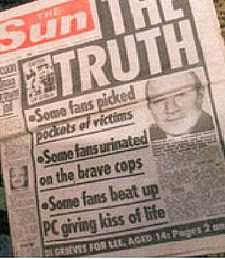 As you’ve probably seen, a handful of days after the pop singer Stephen Gately died, and even after the coroner had pronounced his sudden death to have been the result of natural causes, the ever-humane Daily Mail printed a column by Jan Moir which had the suspicious whiff of homophobia about it, suggesting Gatey’s lifestyle may have been responsible for his death. Classy.
As you’ve probably seen, a handful of days after the pop singer Stephen Gately died, and even after the coroner had pronounced his sudden death to have been the result of natural causes, the ever-humane Daily Mail printed a column by Jan Moir which had the suspicious whiff of homophobia about it, suggesting Gatey’s lifestyle may have been responsible for his death. Classy.
The article has, I gather led to a record number of complaints being made to the Press Complaints Commission – there’s a good summary of the series of events here. And though I usually try to avoid writing about topical events too often here on’t blog (due to the fact that, all too often, far wittier folks tend to get there before me), I had a few thoughts (on the subject, not in total in my life) which I wanted to share…
Firstly, and because it’s always fun to make this clear, I think the Daily Mail is a criminal waste of newsprint; its obsession with house prices and immigrants and cancer make it frankly laughable, and it would be a joke if it wasn’t for the fact that so many people seem to take its contents seriously. The paper’s aimed at a weird audience, one who believes that young people nowadays are all promiscuous and whorish, but who simultaneously like lots of pictures of Charlotte Church or Cheryl Cole in low-cut dresses in their newspapers. Lord only knows what kind of demographic this is, but they clearly keep on buying the grotty little rag.
Given that the Mail‘s never been that keen on gay people or their lifestyles, it’s probably inevitable that they ran a column in the usual post hoc ergo propter hoc style about Stephen Gately: he was gay, he died suddenly, and therefore his premature death was caused by being gay. Sure, they didn’t run a ‘being white and female makes you die in a car crash’ story when the Princess of Wales died, but of course a picture of Diana on the front page was always a good way to boost circulation, and besides ‘white and female’ is a substantial chunk of their target readership. I think it’s fair to say that they’re not keen to court gay readers – though in terms of appealing to the dead, a large number of their readers are probably nearer the grave than the womb, and many of their younger readers may not trouble the EEG machine overmuch.
You may well be wondering why I haven’t linked to the article yet, to let you good people make up your own mind about whether it’s offensive or not; well, fear not, I’m about to, but I wanted to highlight the way that, once they started getting complaints about the article, the Mail tried to rewrite things so that they didn’t look as bad – remember how Russell Brand (and we’ll get back to him later) pointed out that the Mail, which had been so critical of him and Jonathan Ross, had, after all, supported Mosely and the Blackshirts, and asked which was worse? The Mail tried to ignore this remark, despite it being an established fact about the paper’s history, and in a not-entirely dissimilar way, once they realised that they had a PR problem on their hands with the Moir article, they changed the title of it on their website. Oh the bravery.
So, having originally titled the column “Why there was nothing ‘natural’ about Stephen Gately’s death”, the Mail proudly and heroically renamed it “A strange, lonely and troubling death . . .”, and indeed that’s the title which now sits atop the page – have a look here. The courage of their convictions is so impressive.
And so there was a fuss – to my delight, catalysed by openly gay folks such as Stephen Fry and Derren Brown – and a semi-reaction from Jan Moir saying that the response had been “clearly a heavily orchestrated internet campaign “, with lots of complaints to the Press Complaints Commission (as well as people publishing Moir’s home address online, which I do feel is going too far). And the Mail is now in an interesting position, because a year ago this week, the paper was very much at the front of the placard-bearing crowd objecting to the phone calls made by Russell Brand and Jonathan Ross to Andrew Sachs. So, in the face of a similarly orchestrated campaign of complaint, how will they react?
By analogy with the Ross-Brand-Sachs affair, the writer should resign and the sub-editor and editor should be sacked, though I doubt this’ll happen; as many people found during World War II when publications had to be recycled as lavatory paper, when it comes to newspapers, the shit just doesn’t stick. The Sun may have accused football supporters of raiding the pockets of the dead at Hillsborough (see picture), the Scottish Sunday Express may have written about the frankly teenage lives of teenage survivors of the Dunblane massacre, and every single paper in the world may have been implicated in Charles Spencer’s impassioned eulogy for his sister, but the last place you’re likely to see these things reported – let alone discussed – is, it seems, a newspaper. Which makes me wonder if newspapers are necessarily in much of a position to criticise when MPs circle the wagons and try to protect themselves (or each other) from criticism or revelations about their lives.
As with the Trafigura situation last week, the newspapers were rather trumped by the internet, as people broke the ludicrous injunction via e-mails, blogs and Twitter, and the same approach has been taken in relation to the complaints about the Gately article (which I think is perfectly fair; I just wish that similarly well-orchestrated campaigns could be run about so many of their other articles). It makes me wonder if the ‘decline in respect for authority’ which the Mail and other papers lament is in some way directly related to the rise of communication technology – it must have been much easier to hide some wrongdoing in the days when people didn’t have telephones to share things they’d heard about (let alone e-mail), and perhaps that lack of evidence of naughtiness in authority was somehow the foundation for the much-vaunted respect that people ‘used to have’? Just a thought, but it certainly can’t help that when something dodgy’s going on in high places, people can have the details within minutes, and pass them on just as quickly.
I wouldn’t want to go so far as to suggest that the internet and 3G and the like will directly replace or remove traditional print journalism, but they’re clearly having an effect on the way people gain information about the world about them; newspapers have already found their ‘source of news’ role reduced by the rise of constantly-updated TV and online news, and if the ‘campaigning’ role is also usurped, is there much left? As Clay Shirky noted back in March,“‘You’re gonna miss us when we’re gone!’ has never been much of a business model”, and as we seem to be gradually feeling our way towards some new and as yet uncertain model of newsgathering and reporting, I do think that a lot of papers are going to be shouting that, and sooner rather than later.
In the case of the Mail, though, I’m kind of torn; in moral terms, it’s a festering boil in the bumcleft of humanity, but if it goes bankrupt actual real people with families would lose their livelihoods, and as much as I dislike the way they choose to spend their time, a part of me recognises that they’re still people.
Then again, I like to think the recognition that people can think differently from me and not have to suffer for it means I’ll never be asked to write for the Daily Mail.








